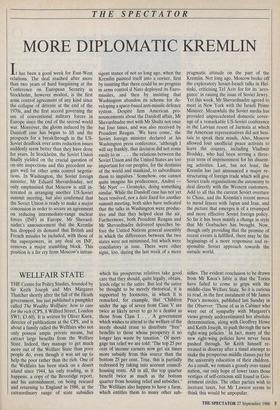THE SPECTATOR
MORE DIPLOMATIC KREMLIN
It has been a good week for East-West relations. The deal reached after more than two years of hard bargaining at the Conference on European Security in Stockholm, however modest, is the first arms control agreement of any kind since the collapse of détente at the end of the 1970s, and the first accord governing the use of conventional military forces in Europe since the end of the second world war. Moreover, the gloom induced by the Daniloff case has begun to lift and the prospects for a breakthrough in the US- Soviet deadlock over arms reduction issues suddenly seem better than they have done for years. In Stockholm, the Soviet Union finally yielded on the crucial question of on-site inspections and this precedent au- gurs well for other arms control negotia- tions. In Washington, the Soviet foreign minister, Mr Eduard Shevardnadze, not only emphasised that Moscow is still in- terested in arranging another US-Soviet summit meeting, but also confirmed that the Soviet Union is ready to make a major concession in order to secure an agreement on reducing intermediate-range nuclear forces (INF) in Europe. Mr Shevard- nadze'( announcement that the Kremlin has dropped its demand that British and French missiles be included, with those of the superpowers, in any deal on INF, removes a major stumbling block. This position is a far cry from Moscow's intran- sigent stance of not so long ago, when the Kremlin painted itself into a corner, first by insisting that there could be no progress in arms control if Nato deployed its Euro- missiles, and then by insisting that Washington abandon its scheme for de- veloping a space-based anti-missile defence system. Despite firm American pro- nouncements about the Daniloff affair, Mr Shevardnadze met with Mr Shultz not once but four times, and was also received by President Reagan. 'We have come,' the Soviet foreign minister declared at his Washington press conference, 'although I will say frankly, that decision did not come easily to us . . . . the relations between the Soviet Union and the United States are too important for our peoples, for the destinies of the world and mankind, to subordinate them to impulses.' Somehow, one cannot quite imagine his predecessor, Andrei - 'Mr Nyet' Gromyko, doing something similar. While the Daniloff case has not yet been resolved, nor a date fixed for another summit meeting, both sides have indicated that the talks in Washington were produc- tive and that they helped clear the air. Furthermore, both President Reagan and Mr Shevardnadze delivered speeches be- fore the United Nations general assembly in which the differences between the two states were not minimised, but which were conciliatory in tone. There were other signs, too, during the last week of a more pragmatic attitude on the part of the Kremlin. Not long ago, Moscow broke off the exploratory Soviet-Israeli talks in Hel- sinki, criticising Tel Aviv for for its 'arro- gance' in raising the issue of Soviet Jewry. Yet this week, Mr Shevardnadze agreed to meet in New York with the Israeli Prime Minister. Meanwhile the Soviet media has provided unprecedented domestic cover- age of a remarkable US-Soviet conference in the Latvian resort of Jurmala at which the American representatives did not hesi- tate to speak their minds. Also, Moscow allowed four unofficial peace activists to leave the country, including Vladimir Brodsky, who had been serving a three- year term of imprisonment for his dissent- ing activities. Last, but not least, the Kremlin has just announced a major re- structuring of foreign trade which will give Soviet trade organisations the autonomy to deal directly with the Western customers. Add to all this the current Soviet overture to China, and the Kremlin's recent moves to mend fences with Japan and Iran, and the picture that emerges is of a revamped and more effective Soviet foreign policy. So far it has been mainly a change in style that Mr Gorbachev has brought. Now, though only providing that the promise of recent events is fulfilled, there may be the beginnings of a more responsive and re- sponsible Soviet approach towards the outside world.


























































 Previous page
Previous page